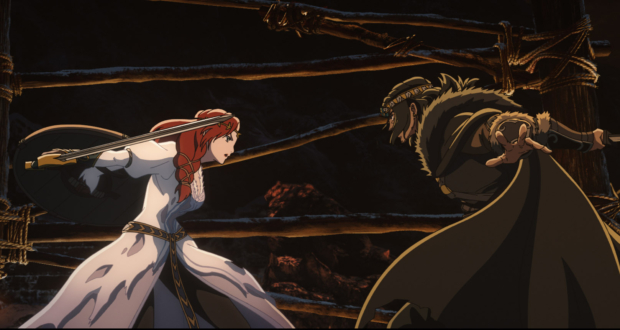In Girl Haunts Boy, director Emily Ting takes a bold leap by blending romantic comedy, fantasy, and horror to tell the story of Cole (Michael Cimino) and Bea (Peyton List), a living boy and a restless ghost. With a premise that promises a quirky mix of the supernatural and heartfelt emotion, the film aspires to be both a touching exploration of grief and a charming tale of love from beyond the grave. While it has moments of sweetness and occasional sparks of creativity, Girl Haunts Boy ultimately struggles to balance its disparate elements, making for an uneven viewing experience. Despite strong performances from its leads, the film’s attempt to juggle too many genres results in a narrative that often feels disjointed, and its fantasy-horror elements fall into predictable tropes.
Premise:
At the core of Girl Haunts Boy is Cole, a teenager grappling with the recent loss of his father. This emotional foundation gives the film a poignant starting point, as Cole’s grief is palpable and well-portrayed by Michael Cimino. Cimino’s performance captures the complexity of his character’s sorrow, a teenager struggling to navigate the world without his father’s guidance. However, where the film falters is in how it treats this emotional depth. Instead of fully exploring the nuances of Cole’s mourning, Girl Haunts Boy too often sidelines his grief in favor of lighthearted moments that fail to resonate emotionally.
Enter Bea, the ghostly counterpart played by Peyton List. Bea’s character, while initially intriguing, feels somewhat underdeveloped, especially given the potential for a rich backstory. As a spectral presence, Bea is tied to an ancient curse that she and Cole must work together to break. The supernatural aspects of the story provide the film with its fantasy-horror framework, but they often come across as a distraction rather than an integral part of the narrative. The “ancient curse” trope, which could have been a fresh take on paranormal romance, ends up feeling like a plot device without much depth or originality.
A lack of chemistry:
The connection between Cole and Bea is supposed to be the heart of the film, but their chemistry feels uneven. While Cimino and List both deliver earnest performances, the relationship between their characters lacks the emotional weight needed to carry the film. The romantic aspect of their bond, while sweet at times, feels rushed and superficial. It never fully develops into something believable, which is a critical flaw given that the film hinges on their connection.
Doesn’t know what it wants to be:
One of Girl Haunts Boy‘s biggest challenges is its attempt to straddle multiple genres. Romantic comedy and fantasy-horror can complement each other when done well, but here the mix feels forced. The film’s tone fluctuates awkwardly between lighthearted, comedic moments and more serious, spooky sequences. The horror elements, in particular, feel tacked on rather than fully integrated into the story. There are moments where the film attempts to create tension or scares, but these are undermined by the frequent shifts back to romantic comedy. The result is a tonal inconsistency that keeps the viewer from fully investing in either aspect of the film.
Weak comedy and horror:
The comedy, while charming in small doses, often feels out of place within the context of the larger narrative. Cole’s witty banter with Bea has its moments, but the jokes and lighthearted exchanges frequently clash with the film’s darker, more somber themes. Bea’s ghostly antics are meant to be playful, but they sometimes come off as juvenile, undercutting any sense of danger or mystery surrounding her character.
The film’s fantasy-horror elements—centered on the curse that Bea is bound to—are similarly underwhelming. The lore behind the curse is never fully explained, leaving much of the supernatural intrigue feeling half-baked. Rather than delving into the mythology of the curse and the rules of the afterlife, the film glosses over these aspects in favor of more predictable plot developments. This lack of world-building diminishes the stakes of Cole and Bea’s quest to break the curse, making their journey feel less urgent and impactful.
No emotional engagement:
One of the film’s biggest weaknesses is its inability to sustain emotional engagement. While Cole’s grief over his father’s death provides an interesting starting point, this emotional thread is largely abandoned as the film progresses. The few moments that do attempt to address Cole’s loss feel superficial and rushed, rather than deeply felt. There is a sense that the film doesn’t quite know how to balance its emotional stakes with its lighter, more comedic moments, resulting in a story that feels emotionally uneven.
Bea’s character arc suffers from a similar problem. As a ghost, her existence is inherently tied to unresolved emotional issues from her past life, but the film fails to fully explore these. Bea’s motivations for wanting to break the curse are never made entirely clear, and her backstory feels thin. Without a deeper understanding of who Bea was before she died, it’s difficult for the audience to truly care about her fate.
Direction:
Emily Ting’s direction shows glimpses of creativity, particularly in her use of visual motifs to represent the divide between the living and the dead. The film’s color palette shifts subtly when Bea is present, with cooler tones signaling her ghostly presence. However, these visual touches aren’t enough to elevate the film as a whole. The cinematography, while competent, doesn’t push any boundaries or contribute much to the storytelling. Likewise, the film’s special effects—mostly used to depict Bea’s ghostly abilities—are serviceable but unremarkable.
Overall:
In the end, Emily Ting’s Girl Haunts Boy is a film that tries to do too much and ends up delivering too little. While the premise of a romance between a grieving teen and a ghost is intriguing, the execution leaves much to be desired. The film’s tonal inconsistencies, underdeveloped characters, and lackluster fantasy-horror elements prevent it from becoming the emotional, genre-bending story it could have been.
-
Acting - 6/10
6/10
-
Cinematography/Visual Effects - 5/10
5/10
-
Plot/Screenplay - 3/10
3/10
-
Setting/Theme - 3/10
3/10
-
Watchability - 3/10
3/10
-
Rewatchability - 1/10
1/10














